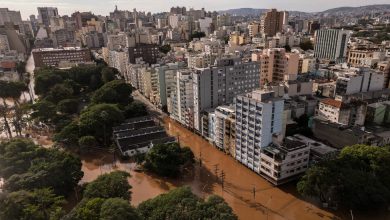Near an Acapulco Beach: Food, Water and Prayer After Hurricane Otis

In a large church displaying a big blue cross near the Acapulco beachfront, dozens of people dozed in sleeping bags along the pews, prayed in silence or anxiously discussed their next move.
Víctor Hugo Sánchez attentively listened to the pleas from people desperate for food, water and gas two days after a Category 5 hurricane had rampaged through the city, leaving hundreds of thousands isolated and without basic resources. As of Monday morning, 45 people were confirmed dead and 47 were missing, according to the Mexican government’s preliminary numbers.
One woman wanted to know whether more water jugs were arriving soon. A man who traveled from Mexico City thanked Mr. Sánchez for finding his missing relatives. Another woman sobbed quietly, asking him to help her get out of the battered city.
Mr. Sánchez, a member of the Guerrero state civil protection agency, had been assigned as a coordinator here and at four other makeshift shelters in the area. “I imagine more people will keep coming,” he said on Friday. An incomplete list put together by local authorities identified 1,656 displaced people set up in hotels, schools and sports complexes.
“This is chaos,” Mr. Sánchez added. “Acapulco is a disaster.”
Inside the church, bottled water was running low. Five plastic crates and one table overflowed with medicine boxes and bottles, but there were no doctors to prescribe them. And despite Mr. Sánchez’s best efforts to ask other authorities to set up a soup kitchen and a water purifier, no support had arrived by Friday.
Security was also starting to become a problem. “Be careful at night,” he said. “They’re raiding. If you get mugged, they take your stuff. They steal your gas.”
But in a city that had been left in darkness after more than 10,000 power poles were knocked down by 165-mile-an-hour winds, the church stood as a bright oasis for anyone wishing to charge their phones or escape from the heat with the breeze from a fan. The shelter had a rare resource, a mobile generator delivered by Mexico’s federal electricity commission.
The Mexican government said on Monday that it has deployed about 18,000 members of the armed forces to Acapulco, as well as thousands of workers from different institutions.
Erik Rojas, one of the commission’s nearly 2,220 electricians sent to Acapulco after the storm, inspected an industrial fridge that held some of the shelter’s supplies. “The power infrastructure is heavily damaged,” he said, puzzled as to why the buzzing machine was not freezing despite the generator.
The commission said on Monday that power had been restored for 65 percent of the affected residents in Acapulco. But progress is challenging.
“It is a total collapse,” said Mr. Rojas, 38, who has had to spend the nights inside his truck. “It’s like building a whole new infrastructure.”
On Thursday, the shelter was overcrowded with visitors from different Mexican states and foreign countries. Eventually, Mr. Sánchez was able to bus out more than 140 of them to the nearest city, Chilpancingo, and the capital, Mexico City. Most of those who remained were locals from nearby neighborhoods.
One local resident, Feliciano Olivorio Díaz, 63, a vocalist and drummer who had sought refuge from Otis’s devastating winds, said: “If it got any stronger, it was going to blow the whole church. We’re fearful that something happens again because it’s quiet out there.”
To lighten the mood, Mr. Olivorio Díaz, who lost his vision six years ago, turned on a hand-held radio and sang. “I sing and the father says that things look bright, that we’re alive,” he said.
But when he placed his cane against a wall outside the church to blast a Mexican cumbia on the radio, only two men were there to listen to him sing.
As Mr. Olivorio Díaz’s voice resonated in the distance, Martha García, 63, was on a desperate mission.
Her husband, Abel Sánchez, 70, had been discharged from the hospital on Tuesday — one day before the hurricane hit Acapulco — after coming down with pneumonia three months ago. “It’s as if misfortune keeps following us,” she said in tears.
Ms. García had left her sick husband at home and come to the shelter, hoping someone could help her find an oxygen tank. His own tank, the only thing helping him breathe, she said, was going to run out of oxygen the next day.
But across the city, the health care system was also destroyed. Even the headquarters of Mexico’s health ministry in Acapulco had been badly damaged.
In a hospital about three miles from the church, Lucía Soriano, 43, knocked on the closed metal gate on Friday. The building’s basement was completely flooded with dark water and debris; blown-out windows scarred the facade.
A security guard emerged from the hallways, following the noise. Ms. Soriano’s 77-year-old mother was scheduled to have eye surgery that morning, she told him.
“There’s no service because there’s no light. There’s no gas. There’s nothing,” he interrupted her, adding that only a small cleaning crew was inside. No doctors were there, and no surgeries would be performed in the near future, he said.
“I’ll come back on Monday,” said Ms. Soriano as she walked away, “to see what they tell me about the appointment, because it’s been paid.”
Even finding food and other supplies has been a major hurdle in the city. Almost every store, supermarket and warehouse across Acapulco has been stripped clean, although the government has begun to distribute provisions.
Back in the church, Ms. García said she had stumbled upon flour tortillas and canned beans in a ransacked convenience store. “That’s what we’ve been eating and what I’ve been feeding my husband,” she said.
She did not plan to evacuate anytime soon. “What I need is oxygen.”




